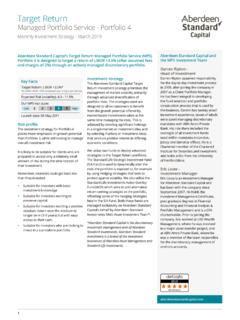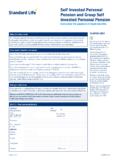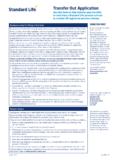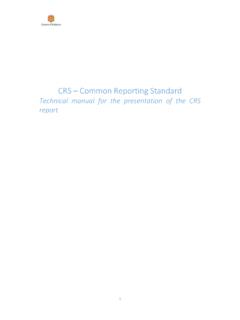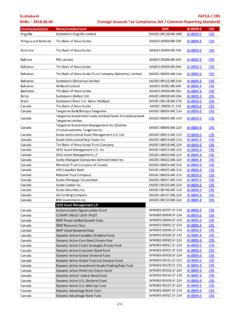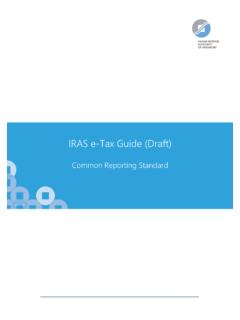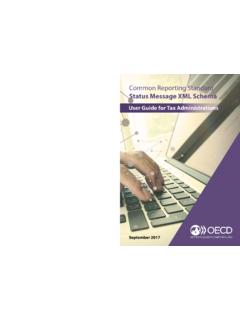Transcription of A guide to FACTA and the Common Reporting …
1 For advisers use guide to FATCA and the Common Reporting StandardContents01 Introduction01 Background02 How are we complying in the UK?02 How are we complying in Ireland?02 How are Court deputies viewed?03 How is a trust viewed04 What happens next?05 Q&As06 Glossary08 Appendix 1 Countries involved09 Appendix 2 Standard Life s GIIN09 Further helpA guide to FATCA and the Common Reporting Standard 01 Standard Life is responsible for identifying customers who are tax resident outside the UK. We may be required to report their details to Her Majesty s Revenue & Customs (HMRC). This directly affects all products except pensions, ISAs and mortgages. While this guide focuses mainly on the position in the UK, similar rules apply in servicing process and our online and paper application forms helps us to capture the additional information we need to comply with the new this initially affected US taxpayers, a large number of countries have now signed up for similar arrangements.
2 These are shown in Appendix 1. More countries may join the regime in the Foreign Tax Compliance Act ( FATCA ) was enacted in the US on 18 March 2010. It helps to identify US taxpayers who may have assets and income is now part of UK legislation and the details are included in the 2013 UK Finance Act. It has also been extended from the original US rules to take into account the other countries who are adopting a similar Institutions such as Standard Life are expected to obtain a formal declaration from new customers about their tax residence during the client onboarding process, and from existing customers where they make changes which indicate they may be tax resident outside the Life has registered with the US Internal Revenue Service (IRS) and is required to meet a number of obligations, which include: Establishing a new account holder s tax residency Updating relevant servicing processes to comply Reviewing existing clients to identify those with non-UK indicia Reporting for US and other in-scope account holders and their account information Implementing an on-going certification process to provide evidence for complianceEach financial institution receives a Global Intermediary Identification Number, or GIIN, when it registers with the IRS.
3 This can be given to other financial institutions on request. Please see appendix Reporting Standard ( CRS )This is the name for what is commonly seen as an extension of FATCA into other jurisdictions. Essentially all Financial Institutions will have an obligation to identify any account holders or controlling persons with a foreign tax residency and report them via HMRC to the relevant foreign jurisdictions are a few new terms associated with this legislation. The new terms will be in bold in the text to make them easier to identify and you ll find them in the Glossary on page A guide to FATCA and the Common Reporting StandardHow are we complying in the UK?We ask an individual during onboarding where they are tax resident and also to provide the relevant Tax Identification Number (TIN).We ask organisations if they are: A trust A company A partnership An LLPWe will then ask them if they are: A financial institution A UK charity An actively trading non-financial services business including non-UK charities/not-for-profit organisations A UK registered pension scheme An investment bodyWe ask them, when appropriate, to confirm where they are resident for tax purposes and then for the relevant TIN if they answer are we complying in Ireland?
4 Our International Bond is provided by Standard Life International, which is based in Dublin. This means that it is subject to the Irish rules on ask an individual during onboarding where they are tax resident and also to provide the relevant Tax Identification Number (TIN).We ask organisations if they are: A trust A company A partnership An LLPWe will then ask them if they are: A financial institution An Irish charity An actively trading non-financial services business including non-Irish charities/not-for-profit organisations A pension fund An investment bodyDepending on how this is answered, the same question regarding country of residence and TINs then which apply to bothThere are some rules that apply to both the UK and Ireland. We may, for instance, also need to obtain details about controlling persons ( trustees).How are Court deputies viewed?A deputy is a person appointed by the Court of Protection to manage the personal welfare or the property and affairs of another person, who lacks the capacity to manage them such circumstances a deputy is usually taking out a product on behalf of a protected person.
5 Such arrangements are currently completely exempt from FATCA/CRS Reporting so a Court Deputy will not be required to answer the questions detailed guide to FATCA and the Common Reporting Standard 03 How is a trust viewed? After discussions with HMRC, we believe that a trust set up to hold a Standard Life bond will not, in most cases, be treated as a Financial Institution, with its own FATCA/CRS has confirmed that appointing a Discretionary Investment Manager (DIM) to manage any assets, held in a bond, and set up under a trust that s for the purpose of investing in a bond, will not of itself trigger any FATCA/ CRS obligations for the trust. This is because the DIM is appointed by Standard Life who is the bond provider and legal owner of the assets. It is not appointed by the trust. As a result Standard Life will be responsible for all FATCA/CRS obligations and will collect the necessary details from your with a financial institution as a trusteeA trust that is defined as a financial institution with a professional trustee is responsible for their own registration and complying with FATCA regulations.
6 However, a trust doesn t need to register if the professional trustee is already registered with the appropriate authority(ies) and is willing to undertake the FATCA/CRS obligations for the trust. This is known as the trustee documented trust managed trustsTrusts with assets that are directly managed by an external professional may have to deal with their own registration and comply with FATCA/CRS, unless the external professional is willing to do this on behalf of the trust. This is known as the owner documented financial institution route and may negate the trust s registration A guide to FATCA and the Common Reporting StandardWhat happens next ?Where existing customers with in-scope products indicate they are tax resident outside the UK, for example, by notifying us of a new address overseas, then we have to contact them to clarify their tax guide to FATCA and the Common Reporting Standard 05Q&As1.
7 Why are ISAs and pensions out of scope?Certain exemptions have been given where the IRS believes there is little, or no, risk of tax evasion by US taxpayers resident in a foreign country. An ISA and a pension are unlikely to be used to evade US tax obligations an ISA, for example, can only be taken out by UK residents and has relatively low annual payment What if a customer refuses to answer these questions?We may refuse to accept business, or we will assume that a customer is a foreign tax resident and report them to What if the customer doesn t complete the TIN?We can still take their business. However, we are required to make reasonable efforts to obtain the TIN. This may include writing out regularly to the customer, asking them to provide it to The new forms allows for five additional countries to be listed: what if the customer is tax resident in more than five countries?
8 It is extremely unlikely that this will happen but if it does please photocopy the relevant Does data protection allow us to report to foreign authorities?Because the UK has introduced FATCA and CRS as domestic legislation, Standard Life will not be Reporting to these foreign authorities; however, we will be Reporting to HMRC. There is no data protection issue with this because we are complying with our obligations under UK law. It is HMRC who will be exchanging relevant information in accordance with the UK s obligations under international treaties. A similar situation will apply in our Irish What happens if we don t report this information?Standard Life could face fines and damage our good relationship with HMRC if we fail to report information under FATCA/CRS. We can also face repercussions in respect of the foreign authorities, for example, the IRS could charge us withholding taxes on any US-sourced income, or income which has been partially earned in the US, even if the individual usually lives outside the What is the difference between tax residency and physical residency?
9 Tax residency concepts can vary from one country to another. Generally speaking tax residency can be based on the number of days someone spends in a country during a tax year; 90 days is often enough to trigger tax residency. In other jurisdictions it can be the number of ties someone has to a country, such as family still living there, owning property and assets there, etc. In addition, a small number of countries, including the US, also consider that anyone holding nationality in that country ( a US passport) is a tax resident of that country, regardless of where they actually Can we just refuse business to foreign taxpayers?We could try but that won t be helpful. Firstly, people can be tax resident in more than one country, so refusing business from a foreign taxpayer could mean we are potentially refusing business from a UK resident. Secondly, with the advent of the CRS, this is already broader than the US.
10 It covers a large number of countries, and is expected to grow rapidly. This would mean restricting our business to UK tax residents only if we wanted to limit our FATCA/CRS obligations and that would still require us to ask tax residency A guide to FATCA and the Common Reporting StandardGlossaryAccount/Account holder This is the name given to the individual and the product they are taking out which is in-scope for FATCA/CRS trading non-financial services businessThis includes all actively trading companies and partnerships that are not financial institutions and do not exist to simply hold investments, or to receive income. This also includes all foreign charities and not-for-profit Reporting StandardThis is the name given to the single global standard for the automatic exchange of information between tax authorities. A large number of countries have signed up to this. See Appendix 1 for the list of those who have signed up so institutionApart from the more obvious entities such as a bank or a life insurance company, this definition also includes certain professionally managed trusts.
